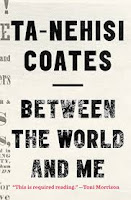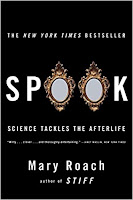Monday, April 13, 2020
Ten Books I Enjoyed but Rarely Talk About
I'm linking up with That Artsy Reader Girl for another Top Ten Tuesday.
This week we're talking about books we liked but haven't mentioned much. These are all books I rated 4.5 or 5 stars but haven't mentioned more than a few times on the blog.
1. Between the World and Me by Ta-Nehisi Coates
Coates is a modern-day James Baldwin, writing about racial identity (and its social and historical construction), police prejudice, and the ways in which his son's experience in today's world is both hopefully different and painfully similar to his own experience growing up black and male.
2. Feeling Good by David D. Burns
I expected this to be a hokey self-help book from 1980, but it's actually foundational for a lot of the work therapists do today to help with depression and anxiety. In clear language with occasional humor, Burns pinpoints common ways your brain will lead you astray and provides concrete exercises to bring those thoughts under control.
3. How to Stop Losing Your Shit with Your Kids by Carla Naumburg
I haven't had the chance to talk about this one much because I just read it recently, but it was a solid 5-star parenting book — concise, practical, and relatable. It's a guide to exactly what the title says, with the acknowledgement that you're never going to be perfect, but you can lose it less often and with fewer lasting consequences.
4. I Bring the Voices of My People by Chanequa Walker-Barnes
Aside from being my favorite read of January, I haven't had a chance to talk about this one much. Without mincing words, Walker-Barnes leads the reader through topics like gendered racism and the problems with racial reconciliation in the church. For all Christians and anyone else concerned with racial justice, I cannot recommend this book highly enough.
5. The Prophet by Kahlil Gibran
It's difficult to classify this book, which may be why I don't bring it up a lot; it's like philosophy and poetry set within the framework of a fictional story. Each chapter of this book contains a short reflection on some area of life — love, friendship, work, religion — and while the ideas are perhaps not new, they are all phrased so concisely and beautifully as to make this book worth reading slowly.
6. Spook by Mary Roach
I enjoy Roach's irreverent scientific journalism. In this book, she takes a humorous approach to reporting on what kind of scientific experiments people have attempted to do to "prove" that there is or is not life after death. I read it almost a decade ago so I'm not entirely sure I would enjoy it as much today, but I liked it when I read it.
7. Still Alice by Lisa Genova
I'm surprised I haven't talked about this one more often, but it's been a while now since I read it. It's extremely well written and puts the reader inside the slowly deteriorating memory of a woman with early-onset Alzheimer's. I still haven't gotten to discuss this with a book club, but I think it would be an excellent pick for that.
8. Storytelling with Data by Cole Nussbaumer Knaflic
This one I haven't really talked about on here because it's something I read for work, but it's a very good book! If you ever have to present any kind of numerical information, Knaflic has a practical guide to making your visuals as clear and uncluttered as possible so that your audience can absorb the information quickly. I would love if more people took her advice!
9. Stride Toward Freedom by Martin Luther King, Jr.
This was a fascinating first-person account of an event — the Montgomery bus boycott — that usually gets no more than a sentence in one's history books. Of course, it's also a carefully crafted treatise on non-violence intended to make King and his colleagues as sympathetic as possible to others during that time period. But I found it most intriguing for all the historical details I hadn't been aware of.
10. The Year of Magical Thinking by Joan Didion
I found this account of the year after Didion's husband's death to be strangely relatable, even though her life was so much different than mine. I could envision myself reacting exactly the way Didion did to the circumstances around her, being at once logical and organized and also superstitious and thinking in circles. Seeing her grief unfold in all its peculiarities and minutia was captivating.
What good books have you not talked about often?
Looking back:
One year ago I was reading: When Broken Glass Floats, We Wish to Inform You That Tomorrow We Will Be Killed with Our Families, and Storytelling with Data
Five years ago I was reading: The Cricket in Times Square, Angle of Repose, and Finding Your Own North Star
Ten years ago I was reading: About Face
Subscribe to:
Post Comments (Atom)











No comments:
Post a Comment